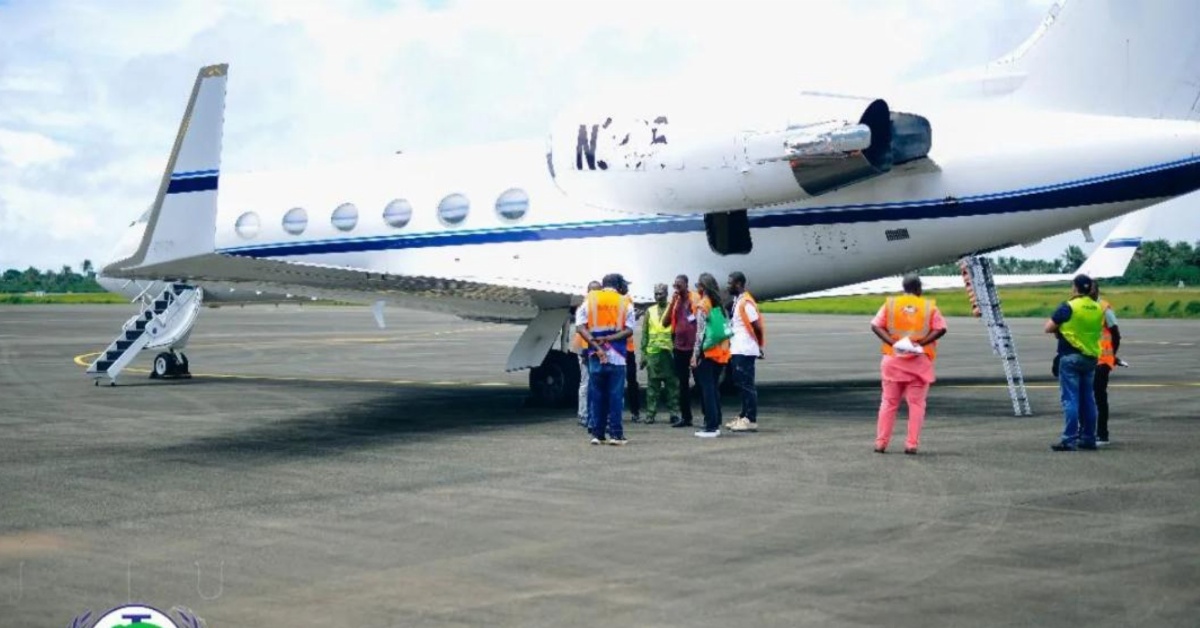The unauthorized landing of a suspicious aircraft at Freetown International Airport on Friday, September 20, has ignited a firestorm of concern across Sierra Leone.
The mysterious flight, originating from Liberia and allegedly en route to Mexico, landed without the necessary clearance and was found to be using a fake registration number.
While the government has issued statements claiming no suspicious items were found on board, many Sierra Leoneans are skeptical about the credibility of these claims.
The involvement of three Mexican nationals, a country widely known for its connection to global drug cartels, and the lack of transparency from the authorities have only fueled speculation that this incident may be part of a larger, more sinister operation.
The Ministry of Information and Civic Education’s official statement on the incident sought to reassure the public that everything was under control. According to the Ministry, four individuals were apprehended on the plane—three Mexicans and one Spanish national.
A joint investigation was launched involving the Sierra Leone Civil Aviation Authority (SLCAA), security forces, and the Office of National Security (ONS). However, the details released to the public have been vague and insufficient, leaving more questions than answers.
Initial investigations revealed that the aircraft had not departed from any officially recognized airfield in Liberia and had failed to make contact with air traffic control before landing.
Despite this glaring violation of international aviation protocols, the authorities have downplayed the severity of the incident by claiming that a thorough search of the aircraft uncovered no suspicious items.
This assertion, especially considering the plane’s destination—Mexico—has left the public questioning the veracity of the investigation.
The involvement of three Mexican nationals immediately sets off red flags, given Mexico’s notorious reputation as a drug trafficking hub.
How can Sierra Leoneans be sure that nothing illicit was found on the plane? If the aircraft was indeed part of an organized drug trafficking operation, why is the government so quick to clear it without presenting solid evidence?
The hasty claim that no contraband was discovered, coupled with the suspicious behavior of the crew, suggests that the authorities might be withholding crucial information.
The pilot, who initially claimed to be unable to speak English, later admitted to being paid $20,000 to fly the plane from Liberia to Mexico.
This revelation should have raised immediate concerns, but instead, the government appears to be brushing the incident under the rug.
The public deserves to know the full extent of this operation, and the SLCAA and the Sierra Leone Police must be transparent about their findings. It is crucial that these agencies release credible and detailed reports to address mounting suspicions.
This is not the first time Sierra Leone has found itself embroiled in a drug trafficking controversy. The country’s strategic location on the West African coast makes it an attractive target for international drug cartels seeking to smuggle narcotics across continents.
The case of the infamous cocaine-laden ship several years ago is still fresh in the minds of many Sierra Leoneans. In that incident, a ship filled with large quantities of cocaine mysteriously disappeared after weeks of government delays and conflicting reports.
The public was left frustrated and disillusioned, as it became clear that powerful forces were at play, protecting those involved from accountability.
The recent aircraft landing bears disturbing similarities to the cocaine ship debacle. Once again, the government is offering minimal transparency and dragging its feet on providing conclusive details about the investigation.
Could this unauthorized flight be another link in the chain of drug trafficking operations that are increasingly using Sierra Leone as a transit point? Are there high-level officials complicit in enabling these activities to go unchecked?
Recent events further raise concerns about Sierra Leone’s potential involvement in drug trafficking. Just weeks before the unauthorized landing, Liberian police reported that a vehicle traveling from Sierra Leone was intercepted, carrying a significant amount of marijuana.
This incident, coupled with the suspicious aircraft landing, points to a troubling pattern. Is Sierra Leone becoming a key player in the West African drug trade?
The Liberia-Sierra Leone connection is particularly concerning. If drug traffickers are able to move illicit substances across the border and through Freetown International Airport, it raises serious doubts about the integrity of Sierra Leone’s security and border control measures.
The fact that the plane landed without any authorization and evaded air traffic control only deepens these suspicions.
The Sierra Leonean public is demanding answers. The SLCAA, the Sierra Leone Police, and the government as a whole must provide a full and honest account of what transpired.
Vague assurances that “no suspicious items” were found are not enough to quell growing fears that the country is being used as a drug trafficking corridor. The authorities must conduct a thorough and transparent investigation into the incident and ensure that those responsible are held accountable.
Furthermore, the government must acknowledge the growing problem of drug trafficking within its borders. For too long, incidents like the unauthorized landing have been swept under the rug, with little to no consequences for those involved. Sierra Leone’s reputation is at stake, and the international community is watching closely. If the country fails to address these issues, it risks becoming a haven for organized crime and drug cartels.
In the wake of this troubling incident, the people of Sierra Leone deserve the truth. The government’s evasive response only serves to deepen mistrust and suspicion. The unauthorized landing of an aircraft linked to Mexico—one of the world’s most notorious drug hubs—should not be taken lightly. The SLCAA, the police, and other security agencies must ensure full transparency and accountability. If Sierra Leone is serious about fighting drug trafficking and preserving its international standing, it must act decisively and openly, ensuring that the public is fully informed about the true nature of this incident and others like it.











